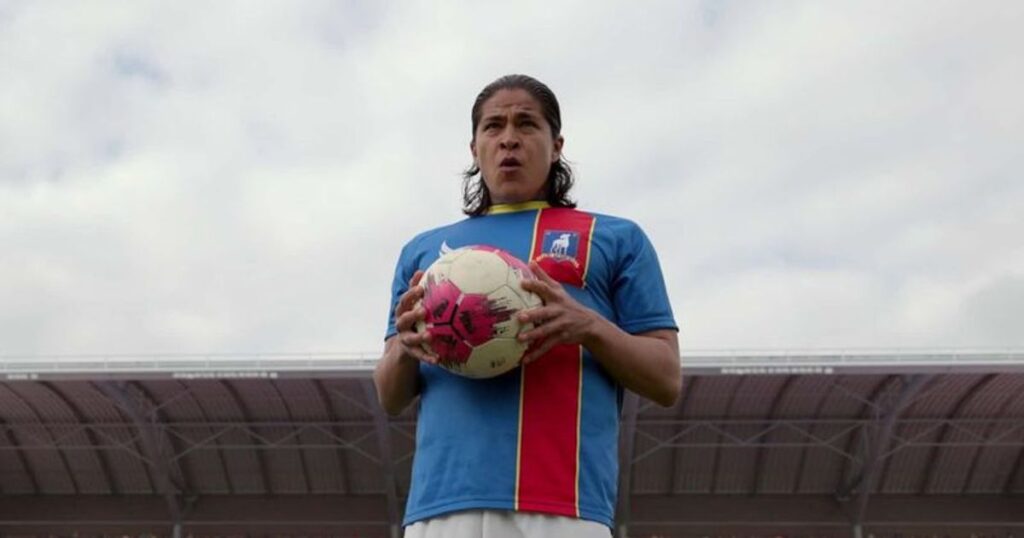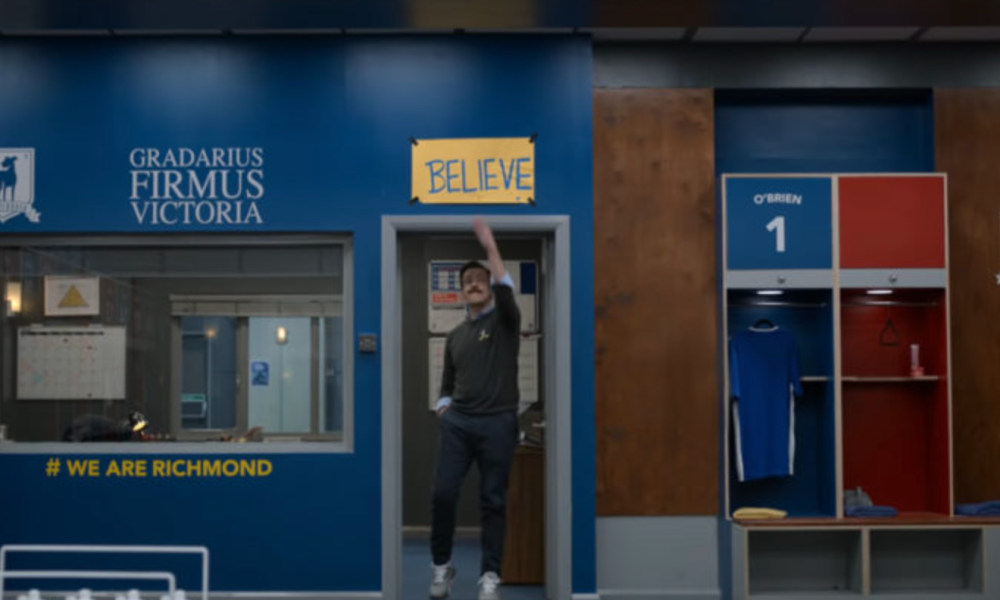The above clip is where I first saw the character Ted Lasso in 2013. Portrayed by Saturday Night Live Alum Jason Sudeikis, the character started out in a series of ads for NBCSports promoting Premiere League Football.
Association Football, obligatory ‘what I know as Soccer’ warning here, has always been something of a mystery to me. I grew up watching and occasionally playing American Football – so Coach Lasso’s brand of enthusiastic but uninformed perspective of the game appealed to me. The character showed up again in a commercial with Tim Howard, and I thought that’d be the last I’d see of Lasso.
To my surprise, I’ve recently found myself watching Ted Lasso again. But this time the character is the lead of a Comedy/Drama show you watch on Apple TV+. I’ve also been surprised to see the show tackle the subject of mental health in a candid and gentle manner. Having gone into the show expecting fun sports goofs, what I got was something entirely different.
Inspired by my friend Komi’s project Men Mental – I’ve been taking a more open approach to talking about my own mental health recently. With World Mental Health Day and the Season 2 Finale of Ted Lasso right behind us – I decided I want to write a little bit on both topics.
In case you’ve found your way here and are looking for support, it’s a fantastic idea to seek out help. A good (and also free) starting place if you are in the US is the SAMHSA National Helpline.
**Spoilers and heavy content ahead**
Anxiety and recurrent Major Depressive Disorder are diagnosed parts of my mental health cocktail and have been since I was a teenager. I want to acknowledge that getting a diagnosis from a professional is a great first step, and also that there are people who may never encounter these particular issues. This isn’t fair, but neither is life.
A quick look at the Statistics from the ADAA show that about 18.1% of adults in the US are effected by anxiety conditions, with about 6.7% of adults being effected by Depression. I feel lucky I’ve had the resources to be able to get diagnoses, both pharmaceutical and therapy support, and the support of my family and friends as I navigate them. I’ve also had supportive managers and coworkers over the years who don’t judge me or treat me differently because of my mental health conditions.
Because of this journey, watching Mental Health events or struggles on screen can be a challenge for me. What has been different about Ted Lasso as a show has been how it helps both its characters and its audience contextualize and process these struggles.
Wait, isn’t this a sports show?
A scene that stands out to me on this topic is where Ted has his first on-screen panic attack in Season One:
I felt this scene in my whole body. The way it’s crafted is excellent and drives an immersive experience. The song Rebecca is singing “Let it go” frames up the theme of the episode – that Ted needs to find a way to let go of his relationship with his wife. The changing of the qualities of the sound (not just the high pitched ringing, though that is effective), Ted’s hands wringing uncontrollably, the blurry focus and abstract camera angles with flashing lights. Ted’s desire to cover the event up was also really familiar. It took me right back to the mall bathroom where I had my first panic attack during a shift at work. There is a normalcy to the way that Rebecca handles this moment, and an understanding that this is something Ted won’t want to tell others about.
What the show doesn’t do after this scene is as important as the scene for me. It doesn’t make Ted’s panic attacks or overall mental health a ‘monster of the week’ that can be fixed in a single arc. It doesn’t make this a temporary set back due to his changing relationship status.
Like real life therapy for many of us, this issue and the underlying causes of it won’t be resolved over a single meal or session.
The show chooses to make this a core of Ted’s character, and then grows on this concept by bringing in a Staff Therapist character (Dr. Sharon Fieldstone played by the wonderful Sarah Niles) for Season 2.
Finding Center
Through the lens of narrative structure, Dr. Sharon is initially brought in to help the character of Dani Rojas overcome a tragic accident. Ted understands that she is here to solve that problem, and he wants to be a part of the solution. This is like medicine for a cold or a treatment for an injury – single use and purpose driven.
What it takes Ted time to see value in is therapy as a tool that is about more than specific incident response. He brings in a bouquet of doubt and anger to his meetings with Dr. Sharon, despite knowing he could benefit from her help. I want to go out on a limb and say this is an attitude many men of my generation and generations prior carry with them into any conversation about mental health. I’ll admit to having my own doubts about therapy and mental health treatments from time to time.
What Ted learns over the course of Season 2 mirrors what I’ve learned. It takes time to find the right relationship and build the trust to start gaining the tools you need to manage your mental health. It is not one size fits all. And regardless of how much optimism, levity or positivity you bring to the situation – you still have to be able to accept things are sometimes unchangeable or out of your control.
Whats helped me to is to think about Talk Therapy (and all its variations) as a sibling to Physical Therapy for a long term injury. It’s going to hurt, it’s going to take longer than you want, and depending how much you follow the instructions you might not get mileage out of it. Many of us would never choose to ‘tough it out’ if we broke a bone, and we can all agree that for something like a back injury a ‘positive attitude’ will likely not be enough. Your mental health is the same.
For Ted? This journey ends up being worth it for him and his players. By the end of Season 2, Ted is able to more meaningfully manage his own mental health and acknowledge some of the reasons he is wired the way he is – characters like Jamie Tartt and Roy Kent also find their own ways forward to healing aspects of their mental health that needed shifting. They also win some games along the way, nice bonus.
The Alternative
In parallel with Ted’s journey of self-discovery, throughout Season 2 we see Nate ‘The Great’ go through his own struggles with managing mental health and perceptions of himself. Unlike the other characters, he primarily chooses to go down these paths alone.
The toll this takes on him is visible, his hair starts turning silver at a fast pace and behind the scenes he becomes quickly irritated and sharp with his colleagues. We get hints of why this might be throughout – it seems Nate’s relationship with his father is strained (there may be another more favored sibling in the family), he is wrestling with self-esteem issues that may stem from the former culture of Richmond FC (before Ted’s arrival), and issues with self-worth that he copes with by making other people the ‘enemy’.
Nate’s goalposts are constantly shifting because of this unhealthy perception of his life. He reacts to kindness and charity with disgust – as if people are being nice to him out of pity. When he initially gets media attention for a smart tactical adjustment, the overwhelming majority of positive notes are entirely disrupted by a small number of negative comments.
Does Nate find professional success during Season 2? Absolutely.
Is that enough for him to find happiness? It is not.
This particular arc also rang true for me – there have been times in my life that in order to distract myself from mental health struggles, I go all-in on work. This works for some people, but it doesn’t work for me.
I learned lessons the hard way when I made that trade-off in the past (work > mental health) and have lost friends, relationships, and acted in ways I look back on with regret. None of us are perfect, and ‘fixing’ this problem once doesn’t mean you won’t make those same mistakes again. What it took to get myself out of that spiral was hard work and confronting uncomfortable things in therapy alongside apologies and tough conversations.
In Season 3 I hope we get to see Nate find his own path to happiness with or without his former friends at Richmond helping lead the way.
Making the last pass

One of the final scenes in season two (where Dani has the last free kick) is pure filmmaking bliss for me. We get to see so many themes and storylines come together and finalize. Jamie gives away the last penalty shot to Dani who can overcome his regrets over the incident at the start of the season. Jamie and Roy have found their relationship healed and strengthened, despite their differences over the years. We get the reminder that “Football is life, Football is death, and Football is also Football”
I was on the edge of my seat after this scene – as Ted’s panic attack during a game has become public news that he’ll have to address after this match. What I expected? A classic Coaching speech that brings everything together in a tidy metaphor and helps us move on with our lives and days. But we don’t get that. What we get is a shot of Ted preparing to answer the question about his own struggles and a conversation about “the way we discuss and deal with mental health in athletics”, and then an abrupt cutaway. I initially thought this was a mistake, a missed opportunity for Ted to talk about Mental Health on a major stage.
I was wrong.
The show doesn’t need to show us Ted’s speech. Because it’s spent a whole season telling us what we need to know. It’s the ultimate “show don’t tell” moment. I can’t wait to see what the storytellers show us in Season 3.
Believe
I had my fingers crossed I’d have some sagacious, succinct, and inspiring way to wrap this article up, but I don’t. Like everyone, the pandemic and quarantine and overall global unrest has made my headspace garbage lately. I think we were all due for a storytelling experience like Ted Lasso.

I still choose most days to “Wake up, Dress up, Show up”. I choose to acknowledge my mental health struggles are a part of me the same way my personality and my abilities are. I lean on the teams around me when I’m struggling, and I choose to help people when they ask for it. I remember that everyone has baggage, and some days we can handle that baggage and somedays we can’t. I remind myself that we’re all doing our best, and that mistakes and stumbles happen. Other days I am a sadness puddle that can’t be helped and that’s okay.
When Ted is confronted by a local about his panic attack news, the local reminds him “Just do the work, pal. You’ll be alright”. For me – the work is going to be continued commitment to therapy, fine tuning my physical health, a whole lot more listening to others, and being kinder to myself.
I choose to believe and I choose to continue doing the work. I hope you’ll join me in both, whatever that means to you. Also let’s hope for a good Season 3!
